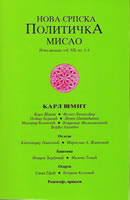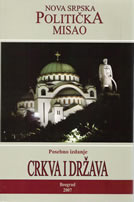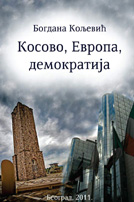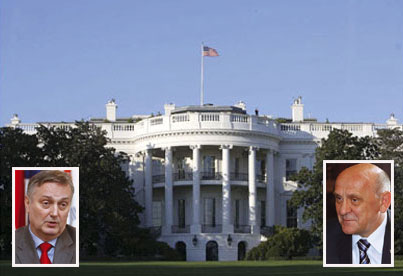| Wikileaks на НСПМ | |||
Sarajevo - Good Bosniaks, Bad Bosniaks |
 |
 |
 |
| понедељак, 27. децембар 2010. | |||||||||||
|
If you are new to these pages, please read an introduction on the structure of a cable as well as how to discuss them with others. See also the FAQs Understanding cables
To understand the justification used for the classification of each cable, please use this WikiSource article as reference. Discussing cables
VZCZCXRO2610 RR RUEHFL RUEHKW RUEHLA RUEHNP RUEHROV RUEHSR DE RUEHVJ #0103/01 0270934 ZNY CCCCC ZZH R 270934Z JAN 09 FM AMEMBASSY SARAJEVO TO RUEHC/SECSTATE WASHDC 9586 INFO RUEHZL/EUROPEAN POLITICAL COLLECTIVE RHEHNSC/NSC WASHDC RUEAIIA/CIA WASHINGTON DC RHEFDIA/DIA WASHINGTON DC RUEKJCS/JCS WASHINGTON DC RUEKJCS/SECDEF WASHDC C O N F I D E N T I A L SECTION 01 OF 03 SARAJEVO 000103 SIPDIS EUR/SCE FOR FOOKS, STINCHCOMB, HYLAND; NSC FOR HELGERSON E.O. 12958: DECL: 01/22/2019 SUBJECT: BOSNIA - GOOD BOSNIAKS, BAD BOSNIAKS, GOOD MUSLIMS, BAD MUSLIMS SARAJEVO 00000103 001.2 OF 003 Classified By: DCM Judith Cefkin, for reasons 1.4 (b) and (d). ¶1. (C) SUMMARY: Amid resurgence over the past two years of politics dogged by nationalist rhetoric, some Bosniak (Muslim) political actors have sought to portray themselves as more capable of protecting Bosniak interests than their opponents. One aspect of this tussle is an increasingly-visible rift in the Bosniak community that centers on what it means to be a "good" or "bad" Bosniak. "Good Bosniaks," according to this sentiment, are those who espouse conservative political and religious ideals. More moderate and secular ideals are, by implication, held by "bad Bosniaks." Statements from the Islamic Community, particularly its leader, Reis Ceric, that label those who criticize Islamic Community as "Islamophobic" have sharpened this polarization among Bosniaks. Bosnia's largest-circulation and most influential pro-Bosniak daily, Dnevni Avaz, has also increasingly championed "good Bosniak" causes and unscrupulously attacked Bosniaks and Bosniak institutions (including a rival, more secular Bosniak daily) that disagree with it. This press war, sparked largely by Avaz's business interests, has helped the intra-Bosniak debate gain traction more quickly and more broadly than it might otherwise. Depending on the path the debate takes, it has the potential, over the longer-term, to steer Bosniak politics in a more conservative direction, which would complicate efforts to forge the compromises among Bosniaks,Serbs, and Croats necessary to secure Bosnia's future. END SUMMARY. Protectors of Bosniak --------------------- ¶2. (C) In a time of international reluctance to engage heavily in Bosnia -- coupled with Bosnian Serb and Croat attempts to establish maximal autonomy for themselves -- Bosniak fears of isolation and abandonment have escalated. The perception of the risks to the Bosniak community among average Bosniaks is genuine, grounded largely in the fact that Bosniaks were the most aggrieved ethnic group during the 1992-95 war and that their plight was ignored by the international community. Reflecting these fears, many Bosniak political leaders over the past two years have campaigned on the idea that they are better able to protect Bosniak interests than their rivals. At the same time, they have framed debate on specific policies within their Bosniak constituency in existential terms. Bosniak member of the Tri-Presidency Haris Silajdzic has been the Bosniak political leader most willing to appeal to these fears -- in fact, he has often deliberately stoked them -) but others, including Party for Democratic Action President Sulejman Tihic and Social Democratic Party leader Zlatko Lagumdzija at times have also done so. Reis Ceric Helps Mold Bosniak Identity -------------------------------------- ¶3. (C) At the same time, the Head of the Islamic Community, Reis Ceric, has sought to promote a Bosniak political identity rooted in "victimization." He has regularly reminded Bosniaks that they are victims of genocide and that they suffered more than any other group in the 1992-95 war. In a Hayat TV interview on January 11, the Reis claimed that following the break-up of the Ottoman Empire, Bosnian Muslims had been variously subjected to "phobias" against Turkey, Islam, and Bosnia itself. He also alleged that media coverage of the alleged threat of Islamic terrorism in Bosnia is, itself, motivated by "Islamophobic" media and "is, in a way, a preparation for a new genocide on Bosniaks." The Reis has, by all accounts, succumbed to the political fray, criticizing or praising Bosniak leaders as he feels appropriate. His public comments about Bosniak identity and Bosniak suffering have clearly been aimed at shaping Bosniak political discourse as well as the positions adopted by the country's leading Bosniak political parties. ¶4. (C) The Reis has also sought to define Bosniak identity in religious terms and has publicly implied that to be a "good Bosniak" one must be a "good Muslim." He has supported policies that are controversial among more secular Bosniaks, such as introducing religious education into kindergarten classes. Ceric has also made use of his public profile and media access to attack critics of his agenda, often implying that his position places him above criticism. In one interview, Ceric claimed that while he personally welcomed constructive criticism, criticism of Islam itself was impermissible. (Note: Ceric clearly intends to be the sole judge of when criticism of him or his administration becomes a criticism of Islam. His past responses to other critics inside and outside the Islamic Community suggest as much. End Note.) "Islamophobes" are Everywhere ----------------------------- ¶5. (C) The Islamic Community has increasingly condemned attacks against itself as anti-Islamic, and as undermining Bosniaks in Bosnia. A November op-ed in the Sarajevo-based daily Oslobodjenje touched on some controversial projects undertaken by the Islamic Community, particularly the Reis' new offices -- now under construction -- which are rumored to be extremely costly. The article also criticized the Reis, as the head of the Islamic Community. In response, the Islamic Community was quick to demonize its critics and imply that their opposition made them "bad Bosniaks." An Islamic Community statement declared the paper's stance to be, "...nothing but a continuation of the genocidal politics designed to wipe the BiH Muslim off the face of the Earth... the Reis' office is very much surprised by the Islamophobic editorial policy of Oslobodjenje." (Note: Ceric and the Islamic Community may be using the "heavy artillery" of insinuating Islamophobia to defend a weak spot, specifically, the widespread perception that his administration has been fiscally irresponsible. End Note.) Santa Claus Didn't Come to Town ------------------------------- ¶6. (SBU) Even Bosniak children are not immune to political efforts to shape the Bosniak identity. There has been a push to introduce Islamic religious education in all kindergartens, a move that one respected professor (known to be an outspoken critic of the Reis) from the Faculty of Islamic Sciences defined as a "crime against children." Similarly, the director of Sarajevo's state-funded preschools attempted to ban Djeda Mraz (Grandfather Frost) in 2007, arguing that Sarajevo is predominantly Muslim and that Djeda Mraz is not part of the Muslim tradition. (Note: Modeled on Santa Claus, Djeda Mraz emerged in Yugoslavia after World War II as a secular figure who gave gifts to children of all religions. End Note) Secular-minded Sarajevo citizens saw the snubbing of Djeda Mraz as an attempt to define for children what it means to be "good" Muslims and organized protests and petitions against the proposed ban. The outrage of Sarajevo citizens was best captured in the editorial comment of FTV's news program 60 Minutes. The show's host, Bakir Hadziomerovic, characterized the director of the public institution "Children of Sarajevo," Razija Mahmutovic, as the fiercest opponent of Djeda Mraz. Taking on an ironic tone, Hadziomerovic sarcastically proposed that Mahmutovic introduce the figure of "Santa Alija," in reference to the elder Izetbegovic. In both cases mentioned here (early religious education and banning of Djeda Mraz), the secular position lost out. Popular Paper Religiously Pursues Bosniak Interests --------------------------------------------- ------ ¶7. (SBU) The definition of a "good Bosniak" as one who is politically and religiously conservative has also been increasingly propagated by the country's largest-circulation, pro-Bosniak daily, Dnevni Avaz. Over the past several months, Fahrud Radoncic, owner of Avaz and its associated businesses, has engaged in a crusade to "protect Bosniak interests," primarily as part of an effort to undercut its opponent, the more secular Oslobodjenje. While Avaz and Oslobodjenje have had a long-running rivalry centered more on business competition than ideology, Radoncic's recent statements represent a clear raising of the stakes. In a TV interview on November 30, Radoncic accused his opponents -- including a number of media outlets -- of "destroying Bosniaks" through attacks on, as he put it, the three key pillars of Muslim faith in Bosnia: the Islamic Community and Reis Ceric; the memory of Alija Izetbegovic, as personified by his son Bakir; and Avaz itself. On December 30, Avaz labeled Ceric a true representative of the Bosniak people, adding "...those who attack Reis Ceric would like to see asituation like before, when the state was appointing the Reis so that he would listen to the state, thus destroying the institution of Islam and the Islamic Community." ¶8. (C) Radoncic has also not shied away from exploiting his position as owner to influence how Avaz presents issues. The December 29 edition of Avaz carried a front page article that slammed those who opposed the construction of a new administrative building for the Islamic Community and accusing them of seeking to put the Islamic Community under their political control, to diminish its power, or to destroy it. Avaz plainly misrepresented facts related to the project, and made use of extensive purple prose in negatively characterizing opposition to the project. The following day, Avaz continued its offensive against "the enemies of Islam" with a full-page interview with Enver Imamovic, a professor of history at the Philosophy Faculty in Sarajevo. Imamovic condemned public attacks against the Islamic Community and Reis Ceric, declaring, "Let us not forget what the Islamic Community meant to our people in the past war. This was the institution around which Bosniak people gathered." Comment ------- ¶9. (C) In an atmosphere of pessimism, created and fueled by a lack of political or economic progress in the country, insisting on the importance of being a proper Bosniak is gaining momentum as a political tool. Lending credence to, and most likely feeding, this discourse is increasingly audacious nationalism among Bosnian Serbs and, to a lesser extent, Bosnian Croats. A growing fear of isolation appears to be providing fodder for political actors, which they can exploit to urge Bosniaks to rally around their leadership and agenda, which some politicians, the Reis and the opportunist Radoncic, have sought to define in conservative and more religious terms. Depending on how this debate plays out, Bosniaks politics could take an increasingly conservative political trajectory. The outcome of this intra-Bosniak debate will likely take considerable time to play out, but its outcome will almost certainly shape public perceptions of who is fit to lead and to speak for Bosniaks, an ethnic group whose sense of identity is still in flux. With all three sides of the ethnic divide retreating to ethnic-based politics, the prospects of compromises necessary for Bosnia's future become much dimmer. ENGLISH |
|||||||||||

.jpg)








 Viewing cable 09SARAJEVO103, BOSNIA - GOOD BOSNIAKS, BAD BOSNIAKS
Viewing cable 09SARAJEVO103, BOSNIA - GOOD BOSNIAKS, BAD BOSNIAKS













